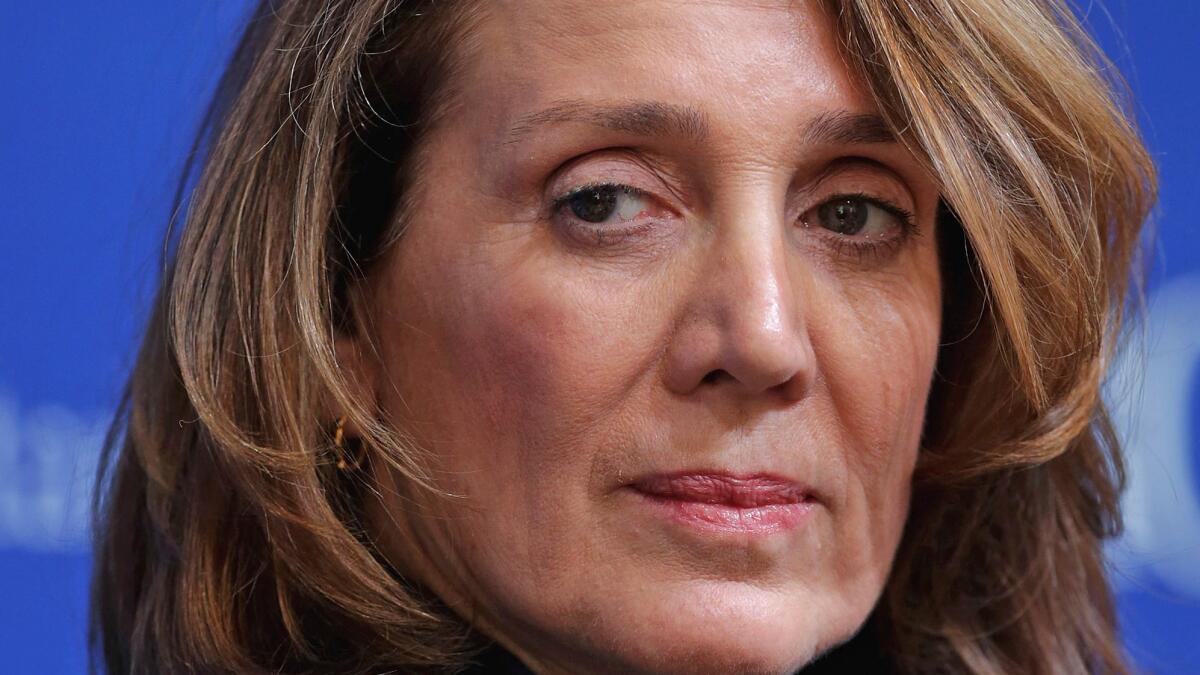Chief financial officers are the rising stars of corporate America

- Share via
Ruth Porat has been on a tear since joining Google in May as its chief financial officer. The former Morgan Stanley CFO was cheered by investors after the company’s second-quarter earnings report, when her remarks — which included hints about more fiscal restraint — helped send its stock soaring 16% the next day, reaching a record high.
Then, when the company surprised many last week with the news that it was restructuring itself in a way that could give investors more insight into its businesses, some speculated that Porat may have influenced the move. Whatever role she played, Porat will now be CFO of the new holding company, Alphabet, as well as remain CFO of its core Google business — a huge job by any measure.
Porat’s prominence is just one example of the ascension of the CFO. More and more chief executives have CFO experience on their résumé — United Technologies CEO Gregory Hayes and Oracle CEO Safra Catz are two named last year.
Chief financial officers have increasingly seen their job description expand far beyond number-crunching to include such things as supply-chain logistics and data security. Twitter CFO Anthony Noto, also thought to be a candidate in the company’s CEO search, was recently given responsibility for marketing, an atypical job for any finance chief.
Meanwhile, the demand for good CFOs to fill these broader roles has grown intense enough that it appears to be thickening their wallets. New data reported by the Wall Street Journal find that raises for CFOs outpaced those for their bosses, growing 13.9% last year, compared with 6.9% for chief executives.
“In the past, everybody said ‘bean counter’ when referring to a CFO,” says Peter Crist, chairman of executive search firm CristKolder Associates. Now, he says, a common refrain is to “find a leader in finance who can do a lot more than finance.”
Recruiters say this shift began with the introduction of the Sarbanes-Oxley Act in 2002, which required both CEOs and CFOs to sign off on financial statements, raising the profile of financial chiefs with their companies’ boards and putting more pressure on directors to get involved in their selection.
Since then, the prevalence of chief operating officers has dwindled, driven in part by board pressure on CEOs to get involved in operational details and by declining interest in publicly broadcasting the company’s heir apparent. That has led to the ascension of the CFO, Crist says, as the chief executive’s right-hand man or woman. “Nature abhors a vacuum,” he says.
Probably even more influential is the growing involvement by activist investors and private-equity players in corporate finances, as well as the growing demand on companies to manage risk and data security.
“We’re seeing a lot of issues surrounding the protection of consumer data,” says Jeremy Hanson, who leads the global financial officers practice at the executive search firm Heidrick & Struggles. “It’s not uncommon for the IT function itself and data security to fall under the CFO’s domain.”
In addition to the security of customers’ data, increased focus on using analytics to make business decisions is putting CFOs in the sweet spot when it comes to corporate intelligence. Sergio Monsalve, a partner with Norwest Venture Partners, says he’s seeing his portfolio companies give CFOs more power and responsibilities.
“The world is moving to caring a lot about two things: money and data,” Monsalve says. “There’s only one person in the company who touches both in an intimate way, and that happens to be the CFO.”
One result of the CFO’s growing power, Hanson says, is that companies now want CFOs to have diverse backgrounds. For the first time since his firm began tracking such data, in 2008, Heidrick & Struggles found that those in non-finance jobs — operations, strategy or general management — are more likely to be tapped as the next CFO than the company’s top accountant or controller.
Then there are the CFOs who are chosen to become operational chiefs or company presidents, which traditionally have been steppingstones to the CEO job, after their time in finance. For instance, Target recently named its CFO, John Mulligan, to be the retailer’s chief operations officer. This is part of an effort by Brian Cornell, the company’s CEO since last year, to flesh out his design for the retailer’s corporate suite.
Crist warns that it’s too early to start thinking about Cornell’s successor at Target. But he says that Mulligan, who was also interim CEO briefly last year, is another example of the new prominence of CFOs. “Historically,” he says, “you would have never seen a non-merchant put into a retail operating job like that.”
Jena McGregor writes a daily column analyzing leadership in the news for the Washington Post’s On Leadership section.
More to Read
Inside the business of entertainment
The Wide Shot brings you news, analysis and insights on everything from streaming wars to production — and what it all means for the future.
You may occasionally receive promotional content from the Los Angeles Times.










